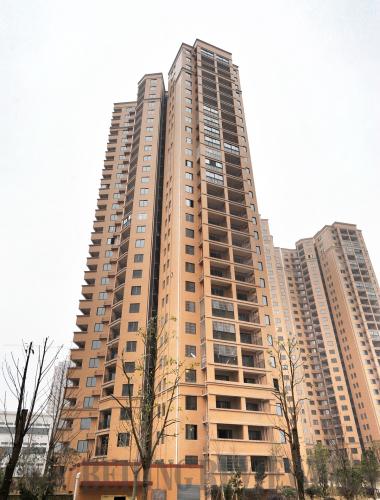|
 |
|
AFFORDABLE HOUSING: A newly built low-income residential building stands at the Changsha, central China's Hunan Province. The province plans to build and renovate a total of 387,700 units of affordable housing in 2012 (XINHUA) |
The International Monetary Fund forecast in early February that China's growth is expected to stay above 8 percent in 2012-13 and the growth rate would drop abruptly if the Euro area experiences a sharp recession. There are also worries that China's economic growth may drop below 8 percent in 2012. How large is the risk?
China's economic growth declined quarter by quarter last year, with year-on-year GDP growth rates of 9.7 percent, 9.5 percent, 9.1 percent and 8.9 percent in the first to fourth quarters, respectively. The growth may continue to decline in the first quarter of 2012. In accordance with this tendency, even if the Chinese economy rallies in the latter half of the year, the whole year's GDP growth would be lower than that in 2011, according to Chen Jiangsheng, professor at the Party School of the Central Committee of the Communist Party of China.
"The current deceleration is no danger, as it is a need for the country's long-term development," said Chen at his blog at xinhuanet.com.
The fast development over the past years left many problems in China, such as rising housing prices, a large income gap and environmental deterioration. The economic structure urgently needs adjustment and the economic growth model should be changed. If these problems are not eased or resolved, the next phase of development will not be sustained, although it has not reached the extent at which the economy might bust without solving these problems. This time, active adjustment is necessary, said Chen.
China adopted a tight monetary policy in 2008, which was interrupted by the outbreak of the global financial crisis in late 2008. The Chinese Government unveiled a 4-trillion-yuan ($632-billion) stimulate package to boost economy in November 2008.
After two years' practice of a moderately loose monetary policy in 2009 and 2010, China was eager to restructure its economy. The country was set to carry out a prudent monetary policy by the end of 2010, and did not put forward new plans after conclusion of the 4-trillion-yuan stimulus plan. That meant active adjustment restarted, said Chen.
As a result, China's economic growth steadily went down in 2011. But the decline is controllable.
First, the current prudent monetary policy is implemented under the condition that the financial environment improves.
Second, many industries including nuclear energy and high-speed railway slowed down greatly in 2011. Once needed, these industries would reboot soon and become new economic growth points.
Third, large-scale treatment of land and ecological environment would become a major factor to drive the country's economy. Despite being a long-term matter, it is not impossible for part of the project to begin.
Finally, the adjustment effort has set measures to prevent excessive economic decline. In accordance with the 12th Five-Year Plan (2011-15), China is slated to build or renovate 36 million units of affordable housing. Construction of some 10 million units began in 2011 and more than 7 million units will be constructed in 2012, which means a total of about 18 million units of affordable housing are under construction this year. This will help ward off huge impacts on upstream production brought about by housing price control measures.
"As a result, there will be smaller possibility for China's economy to grow under 8 percent," said Chen. The downward tendency of China's economic growth is due to an active and sound adjustment, although it does not mean there will be no risks.
If, in the process of adjustment, there were a new crisis in the world economy, China's would face bigger risks, said Chen.
China's imports and exports grew by 22 percent in 2011. It would not produce a great impact if the growth rate were 12 percent in 2012. But it would be dreadful if it reversed and declined by 13 percent in 2009, then the active adjustment this time would have to be interrupted again, which would make it impossible for sound economic growth in the next phase.
"It is impossible for crises to occur in the United States and Japan. It is also impossible for the two countries to have an overall recovery," Chen said.
As for the euro zone, debt crises will at times disturb normal development of the world economy, but it has less probability to evolve into an overall crisis throughout all Europe. Although the debt crisis is a nut to be solved, it is not uncontrollable in the short term. Even if in a critical time, it is possible that the European Central Bank would offer help after reaching consensus among the major euro-zone powers, Chen said.
Chinese premier Wen Jiabo said China stands ready to help the European Union (EU) deal with the debt problems at the recent 14th China-EU Summit held in Beijing this month. "The active attitude sent a favorable message to help raise confidence in markets," Chen Mingming, former Chinese Ambassador to Sweden, was as quoted by chinanews.com.
"The world economy will be constantly slashed and warned, but it is unlikely to erupt into an overall crisis worldwide. As what saying above, 2012 is a severe year for China to seek progress amid adjustment," said Chen Jiangsheng. | 